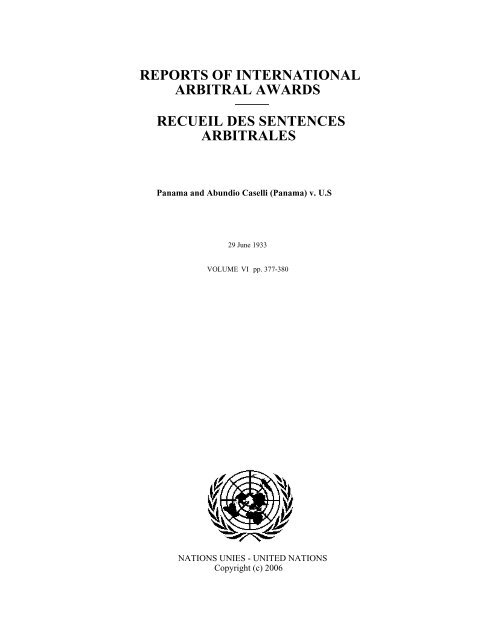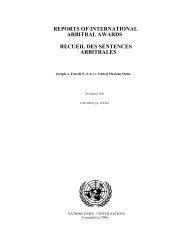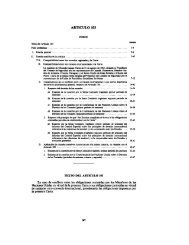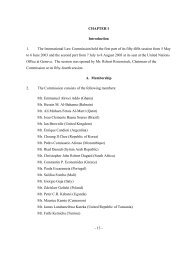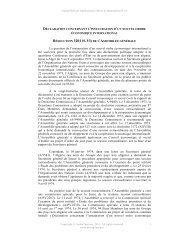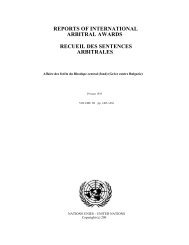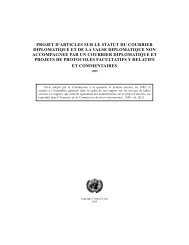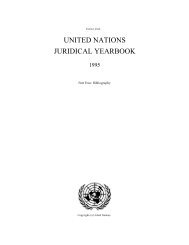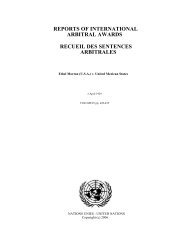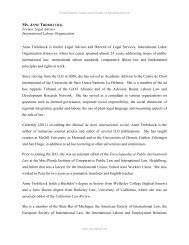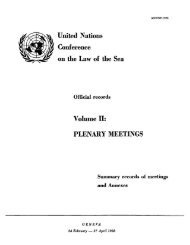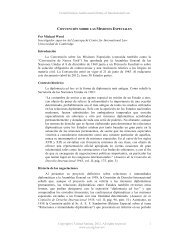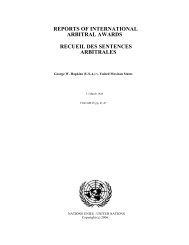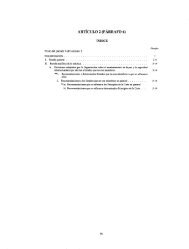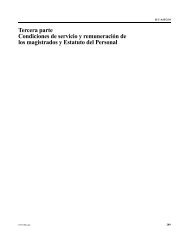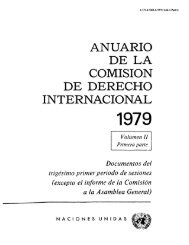Panama and Abundio Caselli (Panama) v. U.S - United Nations ...
Panama and Abundio Caselli (Panama) v. U.S - United Nations ...
Panama and Abundio Caselli (Panama) v. U.S - United Nations ...
You also want an ePaper? Increase the reach of your titles
YUMPU automatically turns print PDFs into web optimized ePapers that Google loves.
REPORTS OF INTERNATIONAL<br />
ARBITRAL AWARDS<br />
RECUEIL DES SENTENCES<br />
ARBITRALES<br />
<strong>Panama</strong> <strong>and</strong> <strong>Abundio</strong> <strong>Caselli</strong> (<strong>Panama</strong>) v. U.S<br />
29 June 1933<br />
VOLUME VI pp. 377-380<br />
NATIONS UNIES - UNITED NATIONS<br />
Copyright (c) 2006
DECISIONS 377<br />
"Not even a decision based on an erroneous interpretation of the law will<br />
permit it. There must be fraud, corruption <strong>and</strong> denial of legal opportunity<br />
to present the case" (Borchard, work cited, p. 332 ; Moore, International Arbitrations,<br />
pp. 2134 <strong>and</strong> 3497).<br />
The decision against the claimant not only was just, but mild. But even if it<br />
had been unjust or severe, it is evident, as Borchard says, that "the State is not<br />
responsible for the mistakes or errors of its courts" <strong>and</strong> that "there is no international<br />
obligation of the State to see that the decisions of its courts are intrinsically<br />
just". It is not possible to admit that foreigners, under pretext of denial<br />
of justice, should enjoy the special privilege of having the sentences passed on<br />
them by the local tribunals subjected to review by an international tribunal,<br />
so that the latter may decide whether the judge's view of the law was correct or<br />
not. This proposition is sound, because while local judges may make mistakes,<br />
international judges are not exempt from error.<br />
Because of what has been set forth, I consider that this claim should be<br />
rejected.<br />
PANAMA AND ABUNDIO CASELLI (PANAMA) v. UNITED STATES<br />
(June 29, 1933, dissenting opinion of <strong>Panama</strong>nian Commissioner, undated.<br />
Pages 625-629.)<br />
JURISDICTION, PRESENTATION OF CLAIM: CLAIM BROUGHT BY STATE ON BEHALF<br />
OF ALIEN.—INTERPRETATION OF TREATY : INFERENCE FROM SILENCE, OBVIOUS,<br />
NATURAL, ORDINARY, REASONABLE MEANING, LANGUAGE IN WHICH DRAFTED<br />
AND EXECUTED.—PRIVATE PROPERTY, EXPROPRIATION: MEANING OF EXPRES-<br />
SIONS. Treaty of 1903 between <strong>United</strong> States <strong>and</strong> <strong>Panama</strong>: transfer of Canal<br />
Zone to <strong>United</strong> States. Executive Agreement of 1904: delimitation of Zone<br />
boundaries. Sale in 1909 by Mr. A. <strong>Caselli</strong>, Swiss citizen, of half interest<br />
in tract of l<strong>and</strong> to <strong>Panama</strong>. Suit brought by Mr. <strong>Caselli</strong> on October 17, 1913,<br />
on the ground that price paid was less than half of true value. Decree of<br />
Supreme Court of October 16, 1914, giving <strong>Panama</strong> option of returning<br />
tract or paying balance. Exchange on February 11, 1915, of ratifications<br />
of Boundary Convention of 1914 transferring some l<strong>and</strong>s, among which<br />
the tract bought from Mr. <strong>Caselli</strong>, from <strong>Panama</strong> to Canal Zone, <strong>and</strong> others<br />
from Canal Zone to <strong>Panama</strong>. Held that Commission competent to decide<br />
Mr. <strong>Caselli</strong>'s claim: jurisdiction expressly conferred by article I, Claims<br />
Convention. Held also that, in the absence of any provision to this effect,<br />
neither party obligated to make payment for l<strong>and</strong> transferred (no inference<br />
of such obligation from mere silence; obvious <strong>and</strong> natural interpretation<br />
of Boundary Convention: exchange of properties) ; <strong>and</strong> that tract bought<br />
from Mr. <strong>Caselli</strong> did not continue to be "private property" within meaning<br />
of article VI, Canal Treaty of 1903, safeguarding rights of owners of private<br />
property: Treaty, drafted <strong>and</strong> executed in English only, must be interpreted<br />
according to ordinary English usage; <strong>and</strong> that use of term "expropriated"<br />
in article I, paragraph 4, Claims Convention, does not amount to admission<br />
by <strong>United</strong> States either of taking of tract other than under Convention<br />
of 1914, or of obligation to make compensation in money: passing to <strong>United</strong><br />
States of perpetual use, occupation <strong>and</strong> control of tract may be described as<br />
"expropriation", <strong>and</strong> compensation for it may be made by transfer of other<br />
property instead of by money payment (obvious <strong>and</strong> reasonable explanation:<br />
"expropriated" used by way of description of claim, not as admission
378 UNITED STATES AND PANAMA<br />
in regard to merits, facts, in which case parties would have specially submitted<br />
to this Commission question of compensation normally <strong>and</strong> appropriately<br />
belonging to Joint L<strong>and</strong> Commission).<br />
Cross-references: Annual Digest, 1933-1934, pp. 438-441 ; Comisiôn General de<br />
Reclamaciones entre <strong>Panama</strong> y Estados Unidos de America, Reclamaciôn de<br />
la Repûblica de <strong>Panama</strong> en su propio nombre y en represent aciôn de <strong>Abundio</strong><br />
<strong>Caselli</strong>, Registre No. 16. (Publicaciôn Oficial, <strong>Panama</strong>, 1934.)<br />
Bibliography: Hunt, Report, pp. 632-633, <strong>and</strong> "The <strong>United</strong> States <strong>Panama</strong><br />
General Claims Commission", Am. J. Int. Law, vol. 28 (1934), pp. 65-73;<br />
Friede, "Die Entscheidungen . . .", Z.a.ô.R.u.V., B<strong>and</strong> V (1935), p. 457.<br />
This is a claim for 14,969 balboas, with interest, on behalf of <strong>Abundio</strong><br />
<strong>Caselli</strong>, or the Government of <strong>Panama</strong>, as their respective interests may appear.<br />
<strong>Caselli</strong> is a Swiss citizen, but jurisdiction to decide the claim is expressly conferred<br />
on the Commission by art. I of the convention under which it acts.<br />
In 1903 the <strong>United</strong> States entered into a treaty with the Republic of <strong>Panama</strong>.<br />
This treaty transferred the <strong>Panama</strong> Canal Zone to the <strong>United</strong> States. The<br />
treaty did not transfer title to the Zone; it transferred the use, occupation <strong>and</strong><br />
control of the Zone in perpetuity, together with such rights as the <strong>United</strong> States<br />
would possess if it were the sovereign thereof. In 1904 the specific boundaries of<br />
the Zone were delimited by executive agreement.<br />
<strong>Caselli</strong> <strong>and</strong> one Pellas were the owners, pro indiviso, of a portion of a tract<br />
of l<strong>and</strong> known as El Tivoli, in the city of <strong>Panama</strong>. For the sake of brevity this<br />
portion of the larger tract is hereinafter called simply El Tivoli. In 1909 <strong>Caselli</strong><br />
sold to the Government of <strong>Panama</strong> his half-interest in the property, less a small<br />
part thereof which he had previously sold to one Abad.<br />
On October 17, 1913, <strong>Caselli</strong> brought suit against the Government to set<br />
aside the sale for lesion énorme, the ground for the action being that the price paid<br />
by the Government was less than half the true value of the property. The suit<br />
was decided in <strong>Caselli</strong>'s favor by the Supreme Court of <strong>Panama</strong> which, on<br />
October 16, 1914, entered a decree giving the Government the option of rescinding<br />
the sale <strong>and</strong> returning the property or paying the balance of the price<br />
declared by the Court to be just.<br />
The Government has never rescinded nor returned the property. On February<br />
11, 1915, the Government owned <strong>Caselli</strong>'s former share of El Tivoli subject to<br />
no lien or encumbrance in favor of <strong>Caselli</strong>. On that date, <strong>Panama</strong> <strong>and</strong> the<br />
<strong>United</strong> States exchanged ratifications of a boundary convention.<br />
This convention contained no express conveyance of any property by either<br />
party to the other; it simply fixed boundaries for the Canal Zone somewhat<br />
different from the boundaries fixed in the original Canal Zone treaty of 1903<br />
<strong>and</strong> delimited in 1904. The result of the Boundary Convention of 1914 was,<br />
however, to place in the Canal Zone some l<strong>and</strong>s which had previously been a<br />
part of the Republic of <strong>Panama</strong>, <strong>and</strong> to place in the Republic of <strong>Panama</strong> some<br />
l<strong>and</strong>s which had been previously in the Canal Zone. Among the l<strong>and</strong>s which<br />
passed to the Canal Zone was El Tivoli.<br />
The Boundary Convention of 1914 says nothing about payment by either<br />
party for the l<strong>and</strong> transferred by the change in boundaries. When the parties<br />
to a document intend to create an obligation to make substantial money<br />
payments, they usually say so. We cannot infer an obligation to make payments<br />
from mere silence. The obvious <strong>and</strong> natural interpretation of the convention<br />
of 1914 is that it effected an exchange of properties <strong>and</strong> that each party was<br />
compensated by the properties received from the other. This conclusion is<br />
reinforced by the fact that the <strong>United</strong> States has not claimed compensation<br />
for the l<strong>and</strong> which the convention of 1914 excluded from the Canal Zone <strong>and</strong>
DECISIONS 379<br />
returned to <strong>Panama</strong>, although pare of this l<strong>and</strong> had been purchased by the<br />
<strong>United</strong> States from the old French Canal Company, a private person, just as<br />
El Tivoli was purchased from <strong>Caselli</strong>.<br />
But the Boundary Convention of 1914 refers back to the original Canal<br />
treaty of 1903, <strong>and</strong> provides that the rights acquired under the Canal treaty<br />
shall not be impaired. Article VI of the Canal treaty contains a provision<br />
safeguarding the rights of the owners of private property. This article provides:<br />
"The grants herein contained shall in no manner invalidate the titles or<br />
rights of private l<strong>and</strong> holders or owners of private property in the said Zone or<br />
in any of the l<strong>and</strong>s or waters granted to the <strong>United</strong> States by the provisions of<br />
any article in this treaty . . ."<br />
The article then goes on to provide for compensation in case private property<br />
is taken or damaged. <strong>Panama</strong> argues that El Tivoli, because it had been purchased<br />
from private persons <strong>and</strong> had not become property of public use, was<br />
"private property" when the Boundary Convention of 1914 took effect; that<br />
the convention of 1914 transferred to the <strong>United</strong> States not title but the use,<br />
occupation <strong>and</strong> control of the property in perpetuity; that in spite of the passage<br />
of the use, occupation <strong>and</strong> control, El Tivoli continued to be private property<br />
entitled to the protection of article VI of the 1903 treaty; <strong>and</strong> that when the<br />
<strong>United</strong> States entered upon <strong>and</strong> used the property it became obligated to make<br />
payment to <strong>Panama</strong>. The Commission does not agree with this reasoning.<br />
In the first place, the treaty of 1903 was drafted <strong>and</strong> executed in English<br />
only. Its words must be interpreted according to ordinary English usage.<br />
By that usage, private property is property belonging to private persons as<br />
contra-distinguished from property belonging to the state. The private nature<br />
of property by that usage does not depend upon the nature of the property<br />
but upon the nature of the owner. By that usage El Tivoli was public <strong>and</strong> not<br />
private property. It did not fall under article VI. In the second place, there<br />
is no evidence in the record that the <strong>United</strong> States ever entered upon El Tivoli<br />
or made any use of it, <strong>and</strong>, in the third place, had there been evidence of such<br />
an entry by the <strong>United</strong> States, it would not have indicated an assertion of any<br />
right in excess of the right of use, occupation <strong>and</strong> control transferred by the<br />
operation of the Boundary Convention of 1914.<br />
At the hearing, reference was made to the terms of the paragraph in article I<br />
of the Claims Convention which submits this claim to the Commission. That<br />
paragraph reads as follows :<br />
"As a specific exception to the limitation of the claims to be submitted to<br />
the Commission against the <strong>United</strong> States of America it is agreed that there<br />
shall be submitted to the Commission the claims of Abbondio [<strong>Abundio</strong>] <strong>Caselli</strong>,<br />
a Swiss citizen, or the Government of <strong>Panama</strong> <strong>and</strong> José C. Monteverde, an<br />
Italian subject, or the Government of <strong>Panama</strong>, as their respective interests in<br />
such claims may appear, these claims having arisen from l<strong>and</strong> purchased by<br />
the Government of <strong>Panama</strong> from the said <strong>Caselli</strong> <strong>and</strong> Monteverde <strong>and</strong> afterwards<br />
expropriated by the Government of the <strong>United</strong> States, <strong>and</strong> having<br />
formed in each case the subject matter of a decision by the Supreme Court of<br />
<strong>Panama</strong>."<br />
It was suggested that the use of the word "expropriated" in this paragraph<br />
amounts to an admission by the <strong>United</strong> States that there was some sort of a<br />
taking by the <strong>United</strong> States of the property of El Tivoli other than the transfer<br />
under the convention of 1914, <strong>and</strong> that the use of the word "expropriated"<br />
also amounts to an admission by the <strong>United</strong> States that there was an obligation<br />
to make compensation in money. Il is conceded that the convention of 1914
380 UNITED STATES AND PANAMA<br />
passed to the <strong>United</strong> States the use, occupation <strong>and</strong> control of El Tivoli in<br />
perpetuity. That in itself may be described as an expropriation. Nothing further<br />
need be inferred in order to make the word "expropriated" appropriate.<br />
Nor does the use of the word "expropriated" imply an obligation to make money<br />
compensation. There is no reason why compensation for an expropriation<br />
should not be made, as apparently it was made under the 1914 convention,<br />
by the reciprocal transfer of other property.<br />
The obvious <strong>and</strong> reasonable explanation of the use of the word "expropriated"<br />
in the paragraph from the Claims Convention, quoted above, is that it was<br />
used by way of identification <strong>and</strong> description of the claim <strong>and</strong> that it was not<br />
intended as an admission in regard to the merits of the claim or in regard to<br />
any of the facts upon which the claim is based. If an admission of liability<br />
had been intended, it is to be assumed that the parties would have stated simply<br />
<strong>and</strong> expressly that they intended to admit liability <strong>and</strong> submit only the question<br />
of compensation.<br />
This conclusion is further strengthened by the consideration that if the use<br />
of the word "expropriated" in the Claims Convention had been meant to<br />
have the effect of conceding the liability of the <strong>United</strong> States to make compensation<br />
for El Tivoli, there would have been nothing for this Commission to do<br />
except to fix the amount of the compensation. In other words, a special submission<br />
would have been made to this Commission for the sole purpose of<br />
having the Commission do something which normally <strong>and</strong> appropriately<br />
would be done by the Joint L<strong>and</strong> Commission. Such an assumption does not<br />
seem reasonable.<br />
The Commission decides that the claim must be disallowed.<br />
Dissenting opinion of <strong>Panama</strong>nian Commissioner<br />
This is a case which, in normal circumstances, would have had to be decided<br />
by the Mixed Commission to which article VI of the Canal treaty of November<br />
18, 1903. refers. Pursuant to this provision the <strong>United</strong> States of America<br />
was bound to pay the owners of l<strong>and</strong> or private properties for the damage<br />
caused to the properties or l<strong>and</strong> which it might be necessary to use in the Canal<br />
work. It devolves on said Mixed Commission only to evaluate <strong>and</strong> adjust the<br />
damage referred to. The liability of the American Government in this regard<br />
was admitted beforeh<strong>and</strong> by the treaty itself. The authority of the Commission<br />
was limited in each case to passing upon the validity of the titles of the claimant<br />
<strong>and</strong> upon the amount of indemnity.<br />
In the General Claims Convention of July 28, 1926, which created this<br />
Commission, the high contracting parties incorporated the paragraph of<br />
article I which is quoted in the majority opinion.<br />
It is evident that the object of this provision was to give the Commission<br />
jurisdiction in two cases in which the claimants were foreigners or could be<br />
subrogated by the Government of <strong>Panama</strong>, <strong>and</strong> also to extend to this Commission<br />
the h<strong>and</strong>ling of claims originally under the jurisdiction of the Mixed<br />
Commission. It is obvious that in these cases it devolved upon this Commission<br />
to proceed conformably with the terms of the treaty which created the Mixed<br />
Commission, in the manner set forth.<br />
Notwithst<strong>and</strong>ing the lucid provision quoted, the majority of the Commission<br />
has departed from the perfectly clear tenor thereof <strong>and</strong>, on grounds inapplicable<br />
to the question, has decided to disallow the claim, with the result that the<br />
stipulation cited has become of no effect whatsoever.<br />
For the reasons set forth, I regret to have to record my inability to agree<br />
with the decision of the majority.


